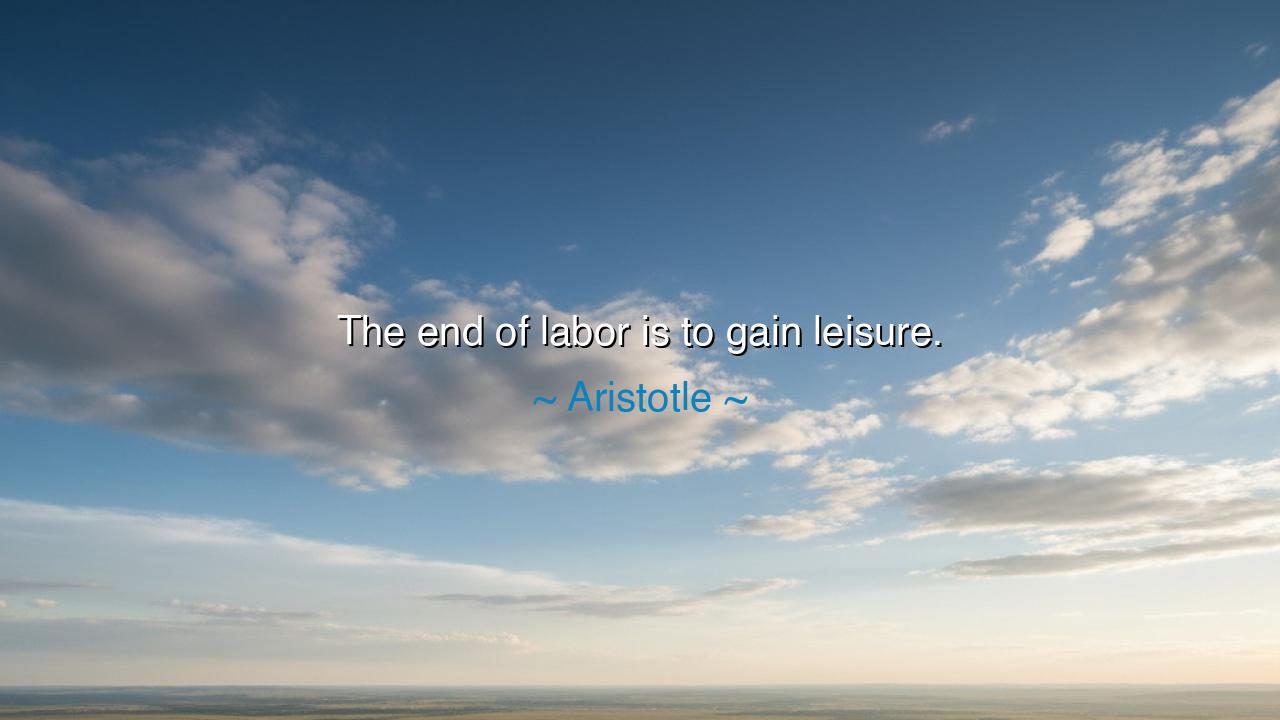
The end of labor is to gain leisure.






Hear the immortal wisdom of Aristotle, who declared: “The end of labor is to gain leisure.” In this saying lies not idleness, but the highest vision of life—that labor is not the final purpose of man, but the means to a nobler goal. For toil sustains the body, but leisure sustains the soul, opening space for reflection, creation, and the pursuit of truth.
The end of labor is not exhaustion, but freedom. Aristotle saw that human beings were not made only to plow fields, build houses, or fill coffers, but to rise beyond necessity into contemplation, virtue, and wisdom. To gain leisure is to step beyond survival into flourishing, to dwell not in chains of duty but in the fullness of choice.
In his age, the Greeks understood leisure—schol?—not as sloth but as the time for philosophy, art, and the cultivation of the mind. It was in leisure that citizens debated, poets composed, and thinkers searched for truth. Without leisure, life would be reduced to endless toil; with it, man could seek what is eternal and elevate himself above mere existence.
Yet Aristotle does not despise labor, for it is the gateway. Without work, leisure cannot be earned; without discipline, freedom decays into waste. He calls us to balance, reminding us that labor has dignity, but its purpose is not endless repetition—it is to carve out the sacred space where the higher life may be pursued.
Thus let this wisdom be remembered: labor sustains the body, but leisure perfects the spirit. Work diligently, but not as though work were the whole of life. Seek the higher end, where the fruits of labor give way to reflection, virtue, and joy. This is the teaching of Aristotle, a law of life passed down through the ages: we labor to live, but we live to grow, to think, and to become fully human.






DANguyen Duc Ankk
This quote brings up an interesting thought about why we work. Is it just for the promise of leisure, or do we actually need some level of engagement and purpose in our daily tasks? Can work be its own form of leisure, where the process itself is enjoyable? Maybe the goal isn’t to escape work for leisure, but to make work so fulfilling that it becomes enjoyable in its own right.
M2manh 2007
Aristotle’s idea of labor ending in leisure seems to reflect a more traditional view of life, but it begs the question: is leisure the ultimate end for everyone? Does this perspective still apply in an era where many people find meaning and fulfillment in their careers? Is it possible to enjoy work so much that leisure no longer feels as important, or is that just an idealistic fantasy?
LHLuong Hien
This quote resonates with the modern struggle to balance work and life. While work can be draining, the idea that leisure is the final goal makes me wonder if we're missing something. Shouldn’t work, in some cases, be something we enjoy? Is leisure really the highest achievement, or should the goal be to blend work and leisure into a more harmonious existence?
TT7C-37 Dao Thanh Tu
Aristotle’s statement seems to imply that work is a temporary burden, and leisure is the true goal. But in a world where many are passionate about their jobs, does this perspective still hold? Could it be that the purpose of work has evolved from just earning leisure to finding purpose and joy in the work itself? How does this idea of leisure impact those who find meaning in their work?
KYKha Y
This quote makes me reflect on the purpose of work. Aristotle seems to suggest that work should be a means to enjoy life, but today, many people find themselves overwhelmed by work and longing for free time. Is leisure really the ultimate goal, or is there a way to make work more meaningful so that it becomes enjoyable in itself? Can the two coexist without one being sacrificed for the other?